LSC UoS BA Business: TESCO Organizational Behavior Report
VerifiedAdded on 2023/01/12
|12
|4162
|84
Report
AI Summary
This report provides a comprehensive analysis of TESCO, a leading UK-based grocery retailer, focusing on its organizational behavior within the context of its business environment. The study explores the impact of economic and non-economic factors, including economic conditions, policies, systems, organizational culture (specifically the Handy culture model), natural resources, social factors, technology, and legal requirements on TESCO's operations. Furthermore, the report employs PESTLE and SWOT analyses to evaluate the external and internal factors influencing TESCO's performance and strategic positioning. The analysis examines the company's mission, vision, and values and their influence on its behavior. The report concludes with a discussion of the implications of these analyses and offers recommendations for future strategies. This report is a case study of TESCO's organizational behavior and the impact of its business environment.
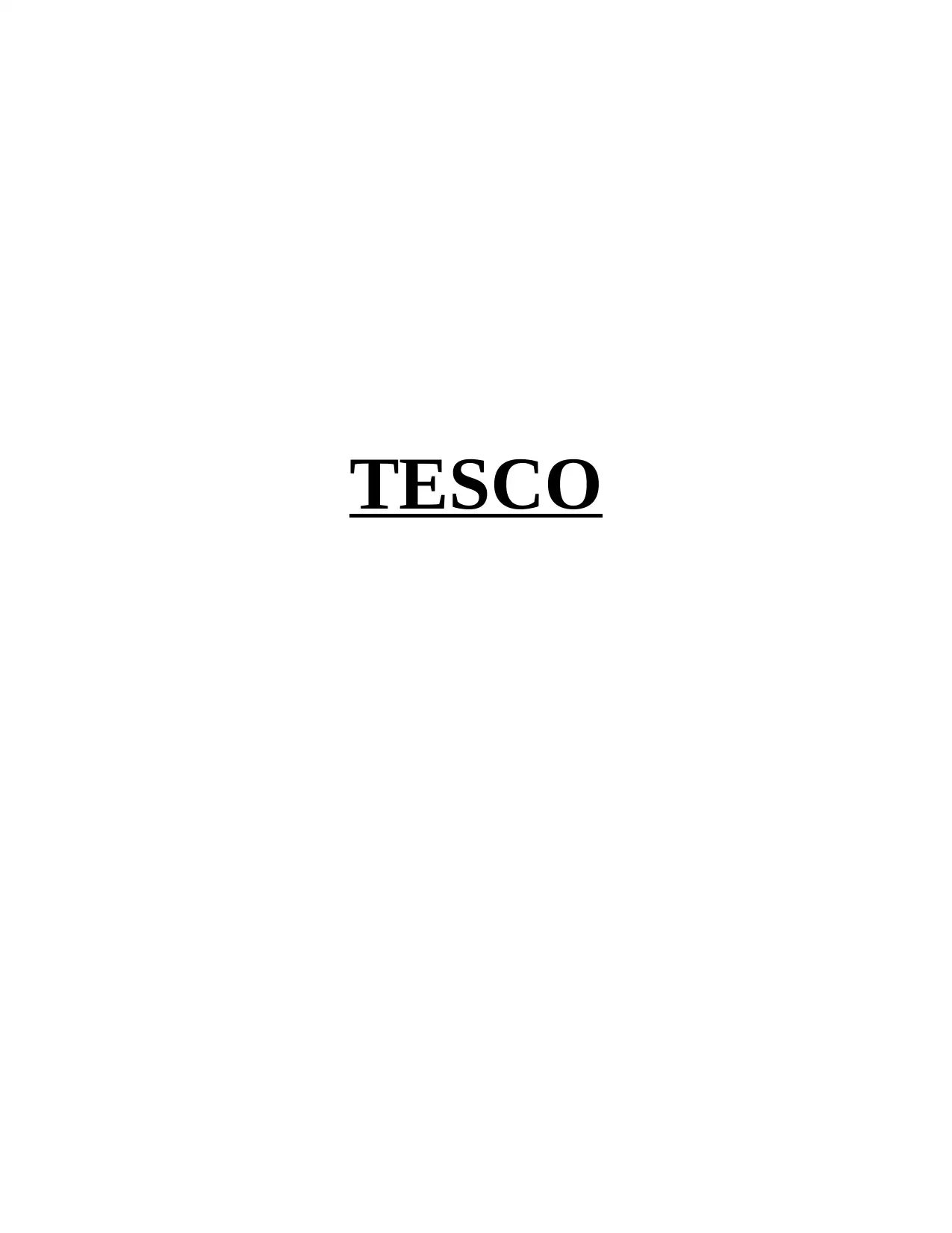
TESCO
Paraphrase This Document
Need a fresh take? Get an instant paraphrase of this document with our AI Paraphraser
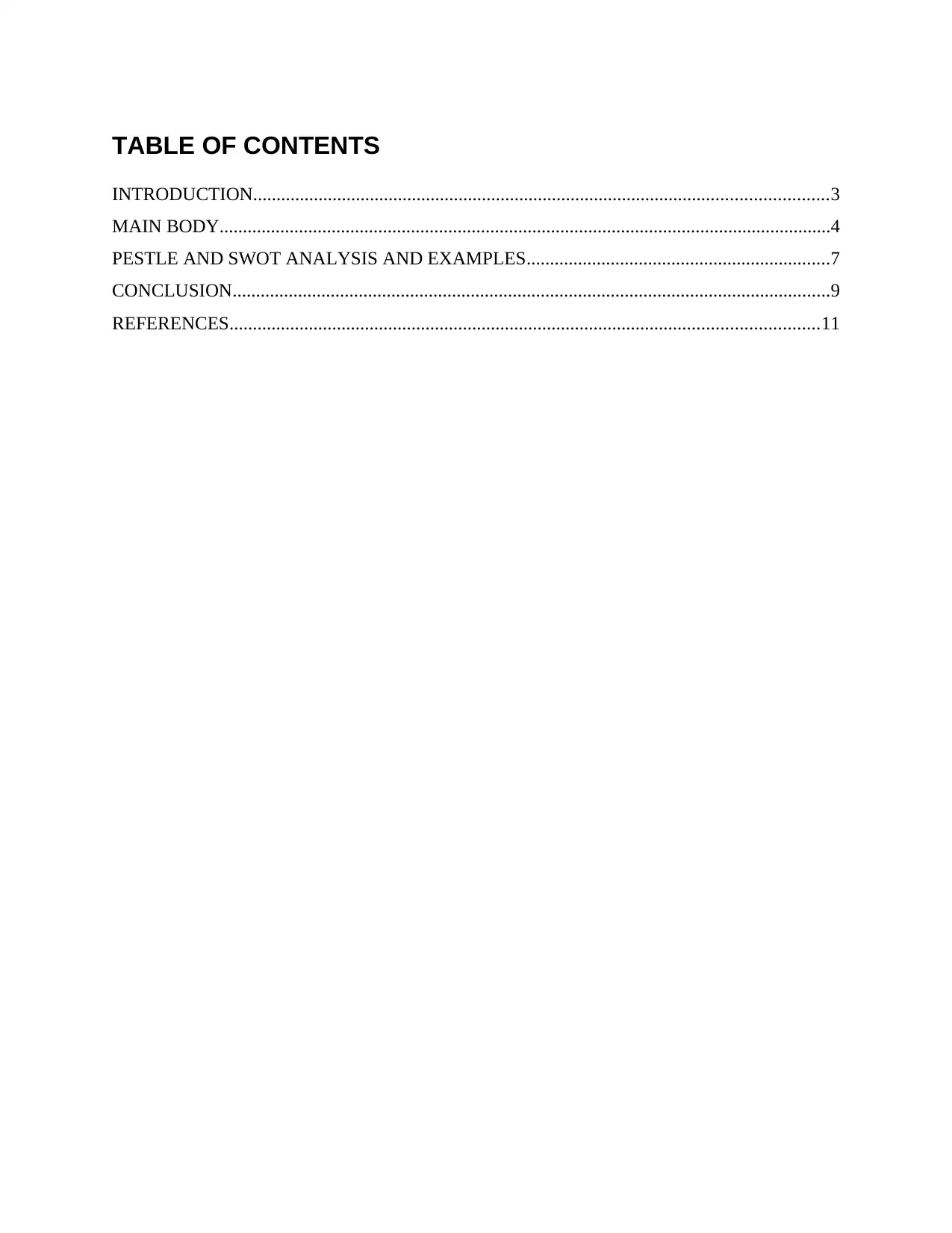
TABLE OF CONTENTS
INTRODUCTION...........................................................................................................................3
MAIN BODY...................................................................................................................................4
PESTLE AND SWOT ANALYSIS AND EXAMPLES.................................................................7
CONCLUSION................................................................................................................................9
REFERENCES..............................................................................................................................11
INTRODUCTION...........................................................................................................................3
MAIN BODY...................................................................................................................................4
PESTLE AND SWOT ANALYSIS AND EXAMPLES.................................................................7
CONCLUSION................................................................................................................................9
REFERENCES..............................................................................................................................11
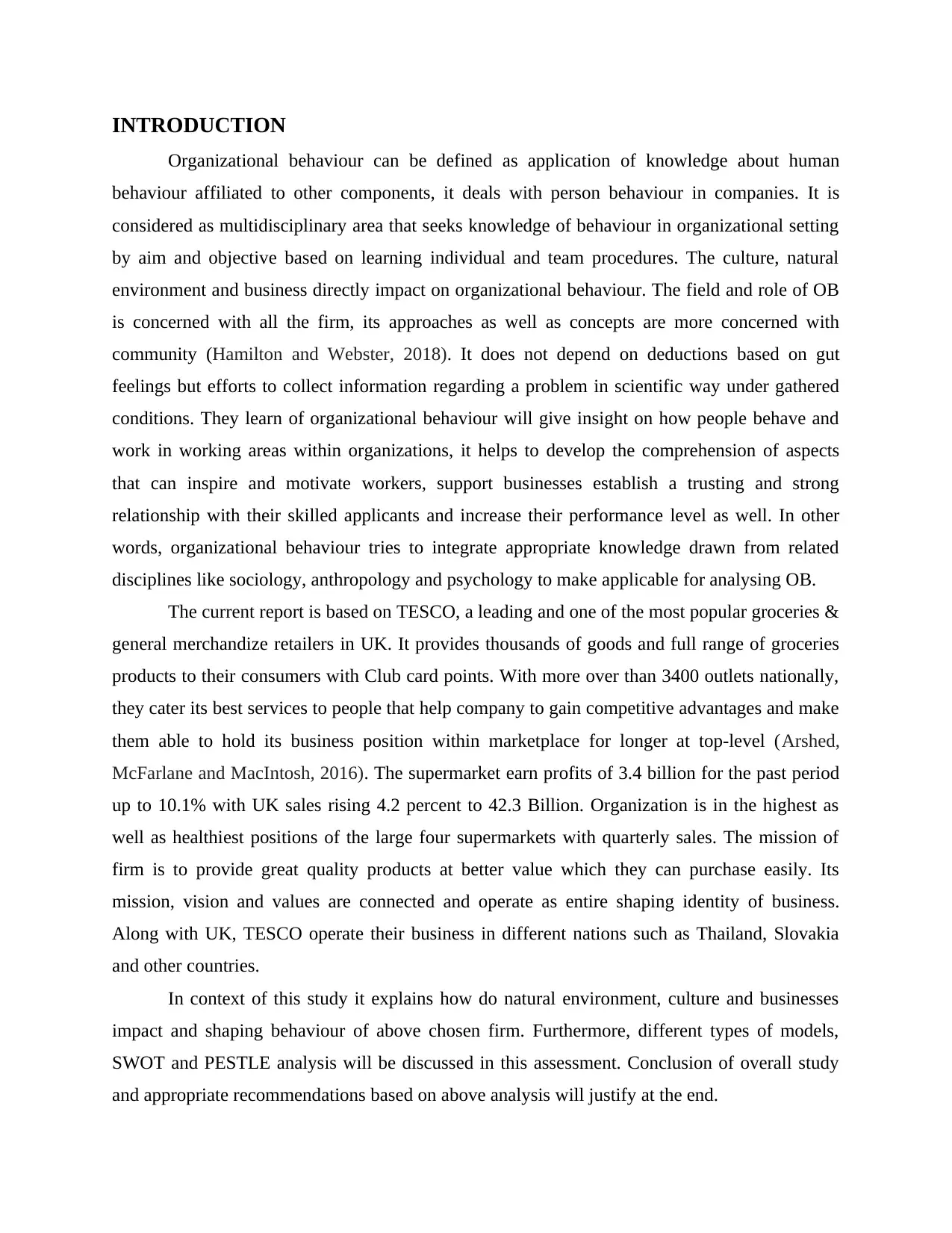
INTRODUCTION
Organizational behaviour can be defined as application of knowledge about human
behaviour affiliated to other components, it deals with person behaviour in companies. It is
considered as multidisciplinary area that seeks knowledge of behaviour in organizational setting
by aim and objective based on learning individual and team procedures. The culture, natural
environment and business directly impact on organizational behaviour. The field and role of OB
is concerned with all the firm, its approaches as well as concepts are more concerned with
community (Hamilton and Webster, 2018). It does not depend on deductions based on gut
feelings but efforts to collect information regarding a problem in scientific way under gathered
conditions. They learn of organizational behaviour will give insight on how people behave and
work in working areas within organizations, it helps to develop the comprehension of aspects
that can inspire and motivate workers, support businesses establish a trusting and strong
relationship with their skilled applicants and increase their performance level as well. In other
words, organizational behaviour tries to integrate appropriate knowledge drawn from related
disciplines like sociology, anthropology and psychology to make applicable for analysing OB.
The current report is based on TESCO, a leading and one of the most popular groceries &
general merchandize retailers in UK. It provides thousands of goods and full range of groceries
products to their consumers with Club card points. With more over than 3400 outlets nationally,
they cater its best services to people that help company to gain competitive advantages and make
them able to hold its business position within marketplace for longer at top-level (Arshed,
McFarlane and MacIntosh, 2016). The supermarket earn profits of 3.4 billion for the past period
up to 10.1% with UK sales rising 4.2 percent to 42.3 Billion. Organization is in the highest as
well as healthiest positions of the large four supermarkets with quarterly sales. The mission of
firm is to provide great quality products at better value which they can purchase easily. Its
mission, vision and values are connected and operate as entire shaping identity of business.
Along with UK, TESCO operate their business in different nations such as Thailand, Slovakia
and other countries.
In context of this study it explains how do natural environment, culture and businesses
impact and shaping behaviour of above chosen firm. Furthermore, different types of models,
SWOT and PESTLE analysis will be discussed in this assessment. Conclusion of overall study
and appropriate recommendations based on above analysis will justify at the end.
Organizational behaviour can be defined as application of knowledge about human
behaviour affiliated to other components, it deals with person behaviour in companies. It is
considered as multidisciplinary area that seeks knowledge of behaviour in organizational setting
by aim and objective based on learning individual and team procedures. The culture, natural
environment and business directly impact on organizational behaviour. The field and role of OB
is concerned with all the firm, its approaches as well as concepts are more concerned with
community (Hamilton and Webster, 2018). It does not depend on deductions based on gut
feelings but efforts to collect information regarding a problem in scientific way under gathered
conditions. They learn of organizational behaviour will give insight on how people behave and
work in working areas within organizations, it helps to develop the comprehension of aspects
that can inspire and motivate workers, support businesses establish a trusting and strong
relationship with their skilled applicants and increase their performance level as well. In other
words, organizational behaviour tries to integrate appropriate knowledge drawn from related
disciplines like sociology, anthropology and psychology to make applicable for analysing OB.
The current report is based on TESCO, a leading and one of the most popular groceries &
general merchandize retailers in UK. It provides thousands of goods and full range of groceries
products to their consumers with Club card points. With more over than 3400 outlets nationally,
they cater its best services to people that help company to gain competitive advantages and make
them able to hold its business position within marketplace for longer at top-level (Arshed,
McFarlane and MacIntosh, 2016). The supermarket earn profits of 3.4 billion for the past period
up to 10.1% with UK sales rising 4.2 percent to 42.3 Billion. Organization is in the highest as
well as healthiest positions of the large four supermarkets with quarterly sales. The mission of
firm is to provide great quality products at better value which they can purchase easily. Its
mission, vision and values are connected and operate as entire shaping identity of business.
Along with UK, TESCO operate their business in different nations such as Thailand, Slovakia
and other countries.
In context of this study it explains how do natural environment, culture and businesses
impact and shaping behaviour of above chosen firm. Furthermore, different types of models,
SWOT and PESTLE analysis will be discussed in this assessment. Conclusion of overall study
and appropriate recommendations based on above analysis will justify at the end.
⊘ This is a preview!⊘
Do you want full access?
Subscribe today to unlock all pages.

Trusted by 1+ million students worldwide
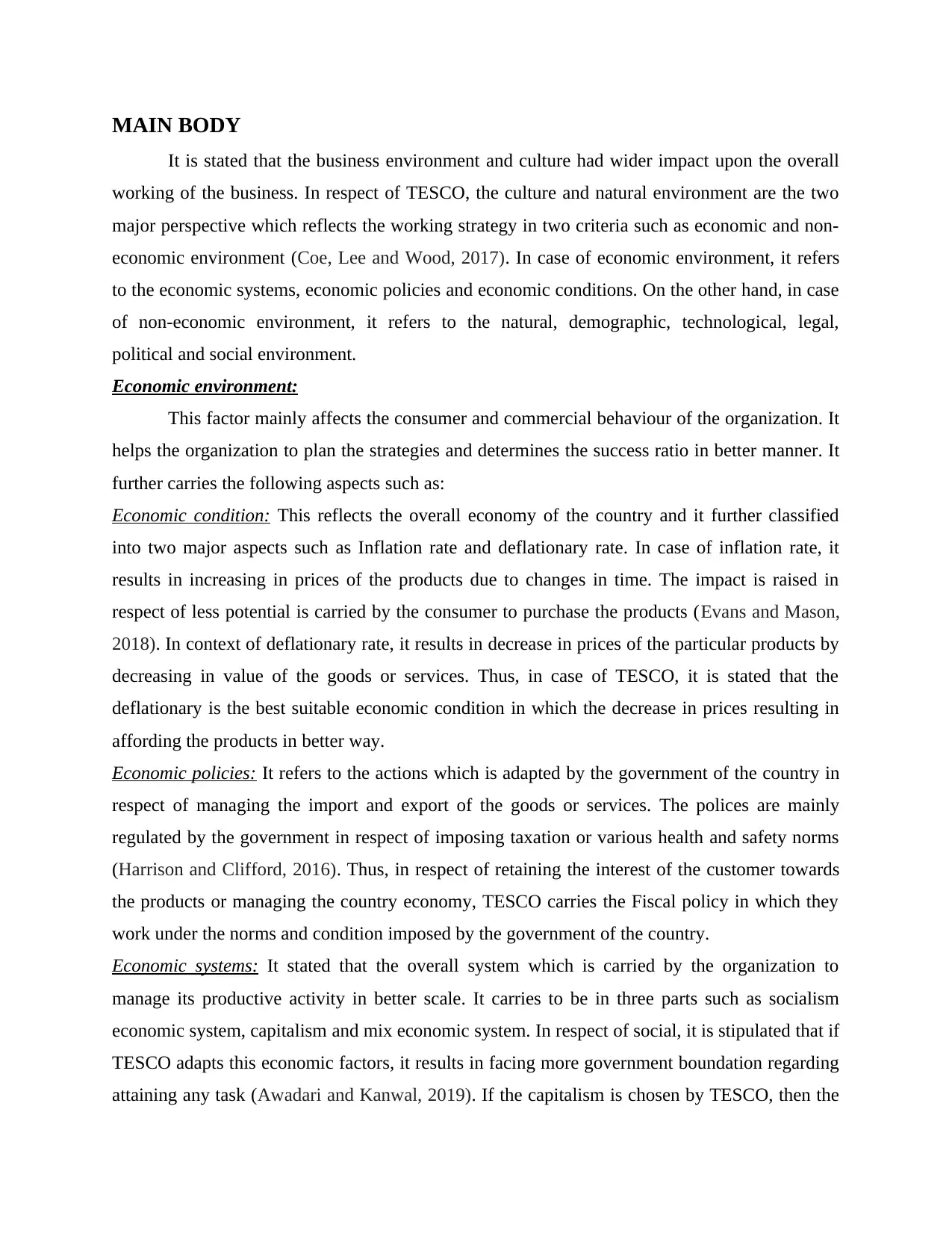
MAIN BODY
It is stated that the business environment and culture had wider impact upon the overall
working of the business. In respect of TESCO, the culture and natural environment are the two
major perspective which reflects the working strategy in two criteria such as economic and non-
economic environment (Coe, Lee and Wood, 2017). In case of economic environment, it refers
to the economic systems, economic policies and economic conditions. On the other hand, in case
of non-economic environment, it refers to the natural, demographic, technological, legal,
political and social environment.
Economic environment:
This factor mainly affects the consumer and commercial behaviour of the organization. It
helps the organization to plan the strategies and determines the success ratio in better manner. It
further carries the following aspects such as:
Economic condition: This reflects the overall economy of the country and it further classified
into two major aspects such as Inflation rate and deflationary rate. In case of inflation rate, it
results in increasing in prices of the products due to changes in time. The impact is raised in
respect of less potential is carried by the consumer to purchase the products (Evans and Mason,
2018). In context of deflationary rate, it results in decrease in prices of the particular products by
decreasing in value of the goods or services. Thus, in case of TESCO, it is stated that the
deflationary is the best suitable economic condition in which the decrease in prices resulting in
affording the products in better way.
Economic policies: It refers to the actions which is adapted by the government of the country in
respect of managing the import and export of the goods or services. The polices are mainly
regulated by the government in respect of imposing taxation or various health and safety norms
(Harrison and Clifford, 2016). Thus, in respect of retaining the interest of the customer towards
the products or managing the country economy, TESCO carries the Fiscal policy in which they
work under the norms and condition imposed by the government of the country.
Economic systems: It stated that the overall system which is carried by the organization to
manage its productive activity in better scale. It carries to be in three parts such as socialism
economic system, capitalism and mix economic system. In respect of social, it is stipulated that if
TESCO adapts this economic factors, it results in facing more government boundation regarding
attaining any task (Awadari and Kanwal, 2019). If the capitalism is chosen by TESCO, then the
It is stated that the business environment and culture had wider impact upon the overall
working of the business. In respect of TESCO, the culture and natural environment are the two
major perspective which reflects the working strategy in two criteria such as economic and non-
economic environment (Coe, Lee and Wood, 2017). In case of economic environment, it refers
to the economic systems, economic policies and economic conditions. On the other hand, in case
of non-economic environment, it refers to the natural, demographic, technological, legal,
political and social environment.
Economic environment:
This factor mainly affects the consumer and commercial behaviour of the organization. It
helps the organization to plan the strategies and determines the success ratio in better manner. It
further carries the following aspects such as:
Economic condition: This reflects the overall economy of the country and it further classified
into two major aspects such as Inflation rate and deflationary rate. In case of inflation rate, it
results in increasing in prices of the products due to changes in time. The impact is raised in
respect of less potential is carried by the consumer to purchase the products (Evans and Mason,
2018). In context of deflationary rate, it results in decrease in prices of the particular products by
decreasing in value of the goods or services. Thus, in case of TESCO, it is stated that the
deflationary is the best suitable economic condition in which the decrease in prices resulting in
affording the products in better way.
Economic policies: It refers to the actions which is adapted by the government of the country in
respect of managing the import and export of the goods or services. The polices are mainly
regulated by the government in respect of imposing taxation or various health and safety norms
(Harrison and Clifford, 2016). Thus, in respect of retaining the interest of the customer towards
the products or managing the country economy, TESCO carries the Fiscal policy in which they
work under the norms and condition imposed by the government of the country.
Economic systems: It stated that the overall system which is carried by the organization to
manage its productive activity in better scale. It carries to be in three parts such as socialism
economic system, capitalism and mix economic system. In respect of social, it is stipulated that if
TESCO adapts this economic factors, it results in facing more government boundation regarding
attaining any task (Awadari and Kanwal, 2019). If the capitalism is chosen by TESCO, then the
Paraphrase This Document
Need a fresh take? Get an instant paraphrase of this document with our AI Paraphraser
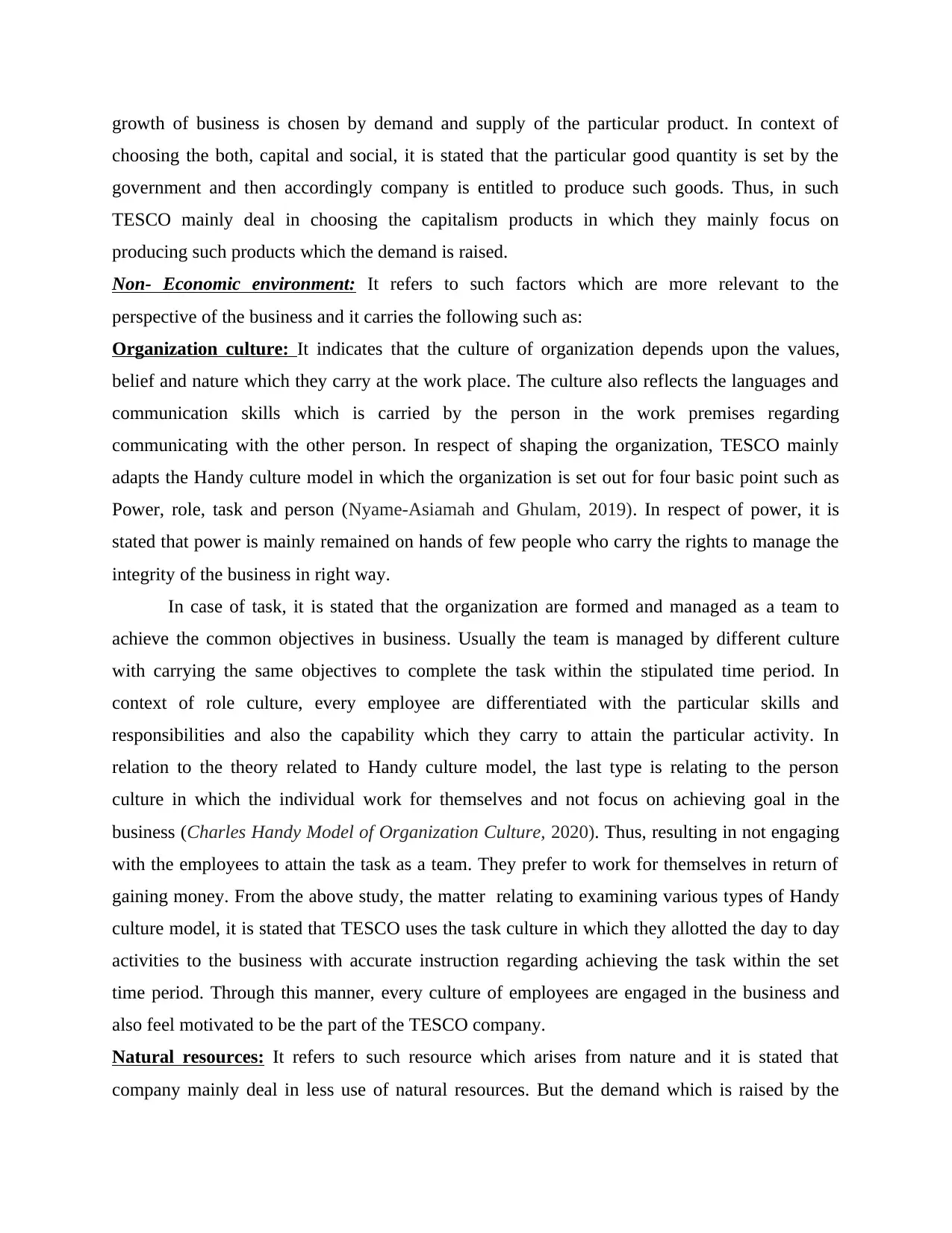
growth of business is chosen by demand and supply of the particular product. In context of
choosing the both, capital and social, it is stated that the particular good quantity is set by the
government and then accordingly company is entitled to produce such goods. Thus, in such
TESCO mainly deal in choosing the capitalism products in which they mainly focus on
producing such products which the demand is raised.
Non- Economic environment: It refers to such factors which are more relevant to the
perspective of the business and it carries the following such as:
Organization culture: It indicates that the culture of organization depends upon the values,
belief and nature which they carry at the work place. The culture also reflects the languages and
communication skills which is carried by the person in the work premises regarding
communicating with the other person. In respect of shaping the organization, TESCO mainly
adapts the Handy culture model in which the organization is set out for four basic point such as
Power, role, task and person (Nyame-Asiamah and Ghulam, 2019). In respect of power, it is
stated that power is mainly remained on hands of few people who carry the rights to manage the
integrity of the business in right way.
In case of task, it is stated that the organization are formed and managed as a team to
achieve the common objectives in business. Usually the team is managed by different culture
with carrying the same objectives to complete the task within the stipulated time period. In
context of role culture, every employee are differentiated with the particular skills and
responsibilities and also the capability which they carry to attain the particular activity. In
relation to the theory related to Handy culture model, the last type is relating to the person
culture in which the individual work for themselves and not focus on achieving goal in the
business (Charles Handy Model of Organization Culture, 2020). Thus, resulting in not engaging
with the employees to attain the task as a team. They prefer to work for themselves in return of
gaining money. From the above study, the matter relating to examining various types of Handy
culture model, it is stated that TESCO uses the task culture in which they allotted the day to day
activities to the business with accurate instruction regarding achieving the task within the set
time period. Through this manner, every culture of employees are engaged in the business and
also feel motivated to be the part of the TESCO company.
Natural resources: It refers to such resource which arises from nature and it is stated that
company mainly deal in less use of natural resources. But the demand which is raised by the
choosing the both, capital and social, it is stated that the particular good quantity is set by the
government and then accordingly company is entitled to produce such goods. Thus, in such
TESCO mainly deal in choosing the capitalism products in which they mainly focus on
producing such products which the demand is raised.
Non- Economic environment: It refers to such factors which are more relevant to the
perspective of the business and it carries the following such as:
Organization culture: It indicates that the culture of organization depends upon the values,
belief and nature which they carry at the work place. The culture also reflects the languages and
communication skills which is carried by the person in the work premises regarding
communicating with the other person. In respect of shaping the organization, TESCO mainly
adapts the Handy culture model in which the organization is set out for four basic point such as
Power, role, task and person (Nyame-Asiamah and Ghulam, 2019). In respect of power, it is
stated that power is mainly remained on hands of few people who carry the rights to manage the
integrity of the business in right way.
In case of task, it is stated that the organization are formed and managed as a team to
achieve the common objectives in business. Usually the team is managed by different culture
with carrying the same objectives to complete the task within the stipulated time period. In
context of role culture, every employee are differentiated with the particular skills and
responsibilities and also the capability which they carry to attain the particular activity. In
relation to the theory related to Handy culture model, the last type is relating to the person
culture in which the individual work for themselves and not focus on achieving goal in the
business (Charles Handy Model of Organization Culture, 2020). Thus, resulting in not engaging
with the employees to attain the task as a team. They prefer to work for themselves in return of
gaining money. From the above study, the matter relating to examining various types of Handy
culture model, it is stated that TESCO uses the task culture in which they allotted the day to day
activities to the business with accurate instruction regarding achieving the task within the set
time period. Through this manner, every culture of employees are engaged in the business and
also feel motivated to be the part of the TESCO company.
Natural resources: It refers to such resource which arises from nature and it is stated that
company mainly deal in less use of natural resources. But the demand which is raised by the
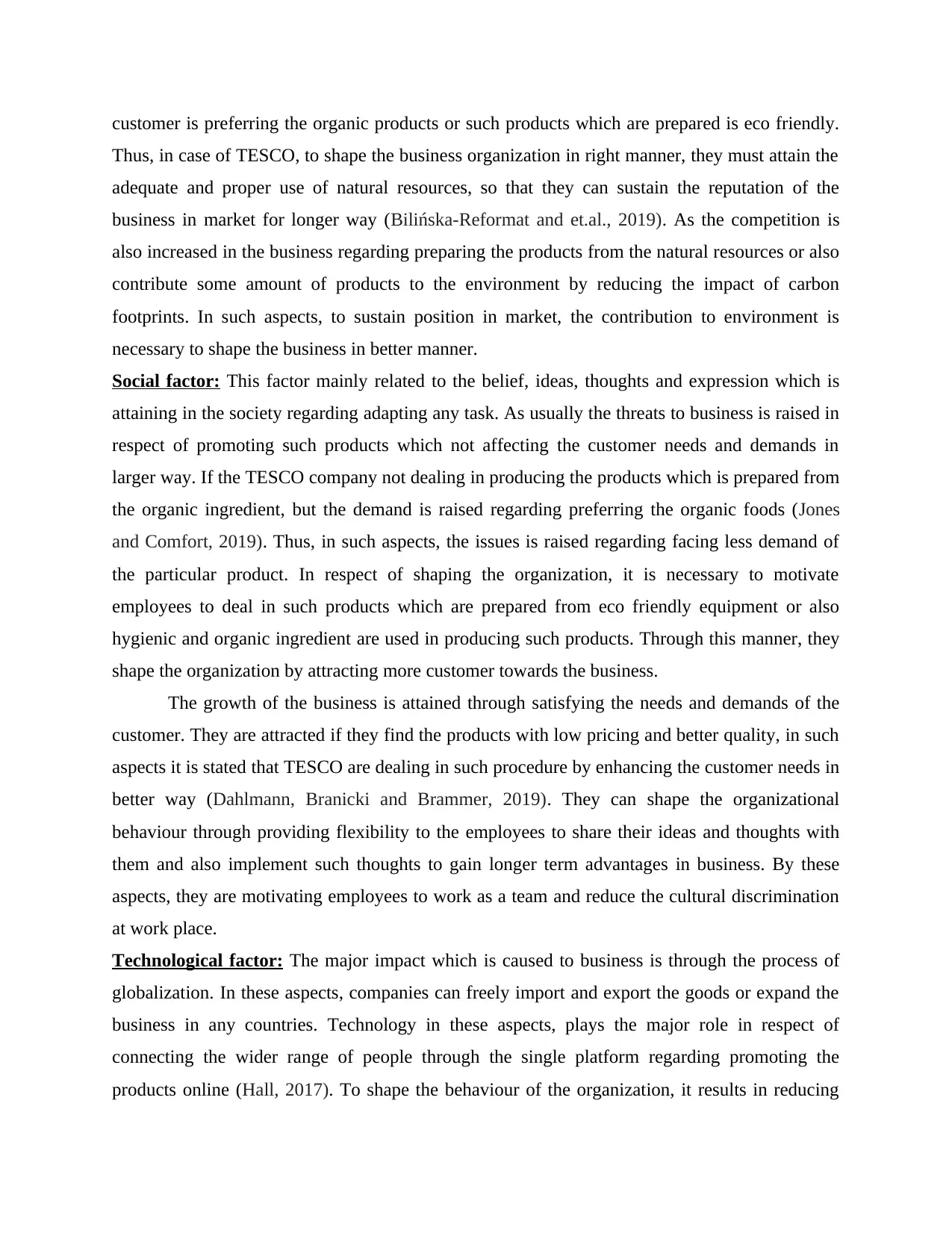
customer is preferring the organic products or such products which are prepared is eco friendly.
Thus, in case of TESCO, to shape the business organization in right manner, they must attain the
adequate and proper use of natural resources, so that they can sustain the reputation of the
business in market for longer way (Bilińska-Reformat and et.al., 2019). As the competition is
also increased in the business regarding preparing the products from the natural resources or also
contribute some amount of products to the environment by reducing the impact of carbon
footprints. In such aspects, to sustain position in market, the contribution to environment is
necessary to shape the business in better manner.
Social factor: This factor mainly related to the belief, ideas, thoughts and expression which is
attaining in the society regarding adapting any task. As usually the threats to business is raised in
respect of promoting such products which not affecting the customer needs and demands in
larger way. If the TESCO company not dealing in producing the products which is prepared from
the organic ingredient, but the demand is raised regarding preferring the organic foods (Jones
and Comfort, 2019). Thus, in such aspects, the issues is raised regarding facing less demand of
the particular product. In respect of shaping the organization, it is necessary to motivate
employees to deal in such products which are prepared from eco friendly equipment or also
hygienic and organic ingredient are used in producing such products. Through this manner, they
shape the organization by attracting more customer towards the business.
The growth of the business is attained through satisfying the needs and demands of the
customer. They are attracted if they find the products with low pricing and better quality, in such
aspects it is stated that TESCO are dealing in such procedure by enhancing the customer needs in
better way (Dahlmann, Branicki and Brammer, 2019). They can shape the organizational
behaviour through providing flexibility to the employees to share their ideas and thoughts with
them and also implement such thoughts to gain longer term advantages in business. By these
aspects, they are motivating employees to work as a team and reduce the cultural discrimination
at work place.
Technological factor: The major impact which is caused to business is through the process of
globalization. In these aspects, companies can freely import and export the goods or expand the
business in any countries. Technology in these aspects, plays the major role in respect of
connecting the wider range of people through the single platform regarding promoting the
products online (Hall, 2017). To shape the behaviour of the organization, it results in reducing
Thus, in case of TESCO, to shape the business organization in right manner, they must attain the
adequate and proper use of natural resources, so that they can sustain the reputation of the
business in market for longer way (Bilińska-Reformat and et.al., 2019). As the competition is
also increased in the business regarding preparing the products from the natural resources or also
contribute some amount of products to the environment by reducing the impact of carbon
footprints. In such aspects, to sustain position in market, the contribution to environment is
necessary to shape the business in better manner.
Social factor: This factor mainly related to the belief, ideas, thoughts and expression which is
attaining in the society regarding adapting any task. As usually the threats to business is raised in
respect of promoting such products which not affecting the customer needs and demands in
larger way. If the TESCO company not dealing in producing the products which is prepared from
the organic ingredient, but the demand is raised regarding preferring the organic foods (Jones
and Comfort, 2019). Thus, in such aspects, the issues is raised regarding facing less demand of
the particular product. In respect of shaping the organization, it is necessary to motivate
employees to deal in such products which are prepared from eco friendly equipment or also
hygienic and organic ingredient are used in producing such products. Through this manner, they
shape the organization by attracting more customer towards the business.
The growth of the business is attained through satisfying the needs and demands of the
customer. They are attracted if they find the products with low pricing and better quality, in such
aspects it is stated that TESCO are dealing in such procedure by enhancing the customer needs in
better way (Dahlmann, Branicki and Brammer, 2019). They can shape the organizational
behaviour through providing flexibility to the employees to share their ideas and thoughts with
them and also implement such thoughts to gain longer term advantages in business. By these
aspects, they are motivating employees to work as a team and reduce the cultural discrimination
at work place.
Technological factor: The major impact which is caused to business is through the process of
globalization. In these aspects, companies can freely import and export the goods or expand the
business in any countries. Technology in these aspects, plays the major role in respect of
connecting the wider range of people through the single platform regarding promoting the
products online (Hall, 2017). To shape the behaviour of the organization, it results in reducing
⊘ This is a preview!⊘
Do you want full access?
Subscribe today to unlock all pages.

Trusted by 1+ million students worldwide
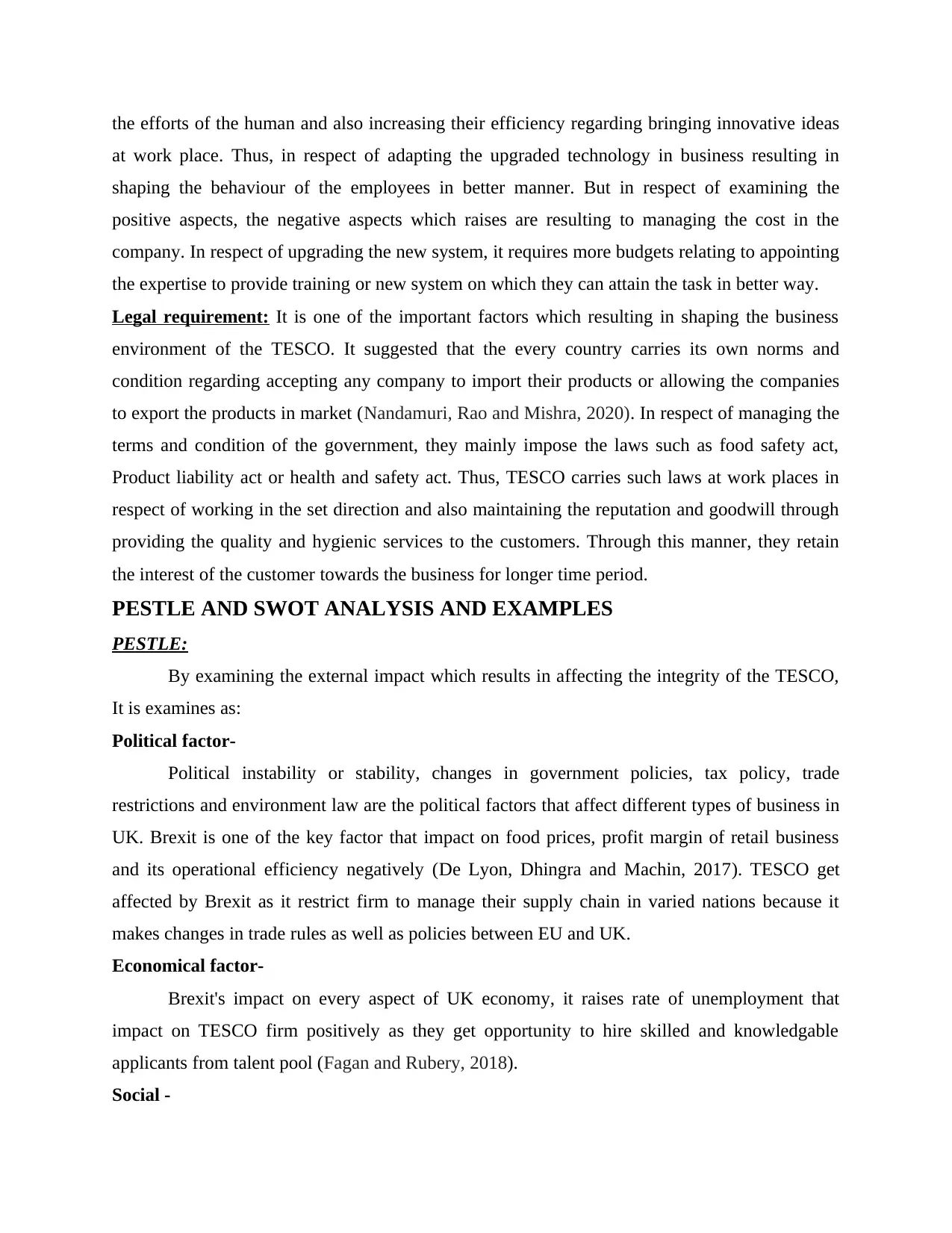
the efforts of the human and also increasing their efficiency regarding bringing innovative ideas
at work place. Thus, in respect of adapting the upgraded technology in business resulting in
shaping the behaviour of the employees in better manner. But in respect of examining the
positive aspects, the negative aspects which raises are resulting to managing the cost in the
company. In respect of upgrading the new system, it requires more budgets relating to appointing
the expertise to provide training or new system on which they can attain the task in better way.
Legal requirement: It is one of the important factors which resulting in shaping the business
environment of the TESCO. It suggested that the every country carries its own norms and
condition regarding accepting any company to import their products or allowing the companies
to export the products in market (Nandamuri, Rao and Mishra, 2020). In respect of managing the
terms and condition of the government, they mainly impose the laws such as food safety act,
Product liability act or health and safety act. Thus, TESCO carries such laws at work places in
respect of working in the set direction and also maintaining the reputation and goodwill through
providing the quality and hygienic services to the customers. Through this manner, they retain
the interest of the customer towards the business for longer time period.
PESTLE AND SWOT ANALYSIS AND EXAMPLES
PESTLE:
By examining the external impact which results in affecting the integrity of the TESCO,
It is examines as:
Political factor-
Political instability or stability, changes in government policies, tax policy, trade
restrictions and environment law are the political factors that affect different types of business in
UK. Brexit is one of the key factor that impact on food prices, profit margin of retail business
and its operational efficiency negatively (De Lyon, Dhingra and Machin, 2017). TESCO get
affected by Brexit as it restrict firm to manage their supply chain in varied nations because it
makes changes in trade rules as well as policies between EU and UK.
Economical factor-
Brexit's impact on every aspect of UK economy, it raises rate of unemployment that
impact on TESCO firm positively as they get opportunity to hire skilled and knowledgable
applicants from talent pool (Fagan and Rubery, 2018).
Social -
at work place. Thus, in respect of adapting the upgraded technology in business resulting in
shaping the behaviour of the employees in better manner. But in respect of examining the
positive aspects, the negative aspects which raises are resulting to managing the cost in the
company. In respect of upgrading the new system, it requires more budgets relating to appointing
the expertise to provide training or new system on which they can attain the task in better way.
Legal requirement: It is one of the important factors which resulting in shaping the business
environment of the TESCO. It suggested that the every country carries its own norms and
condition regarding accepting any company to import their products or allowing the companies
to export the products in market (Nandamuri, Rao and Mishra, 2020). In respect of managing the
terms and condition of the government, they mainly impose the laws such as food safety act,
Product liability act or health and safety act. Thus, TESCO carries such laws at work places in
respect of working in the set direction and also maintaining the reputation and goodwill through
providing the quality and hygienic services to the customers. Through this manner, they retain
the interest of the customer towards the business for longer time period.
PESTLE AND SWOT ANALYSIS AND EXAMPLES
PESTLE:
By examining the external impact which results in affecting the integrity of the TESCO,
It is examines as:
Political factor-
Political instability or stability, changes in government policies, tax policy, trade
restrictions and environment law are the political factors that affect different types of business in
UK. Brexit is one of the key factor that impact on food prices, profit margin of retail business
and its operational efficiency negatively (De Lyon, Dhingra and Machin, 2017). TESCO get
affected by Brexit as it restrict firm to manage their supply chain in varied nations because it
makes changes in trade rules as well as policies between EU and UK.
Economical factor-
Brexit's impact on every aspect of UK economy, it raises rate of unemployment that
impact on TESCO firm positively as they get opportunity to hire skilled and knowledgable
applicants from talent pool (Fagan and Rubery, 2018).
Social -
Paraphrase This Document
Need a fresh take? Get an instant paraphrase of this document with our AI Paraphraser
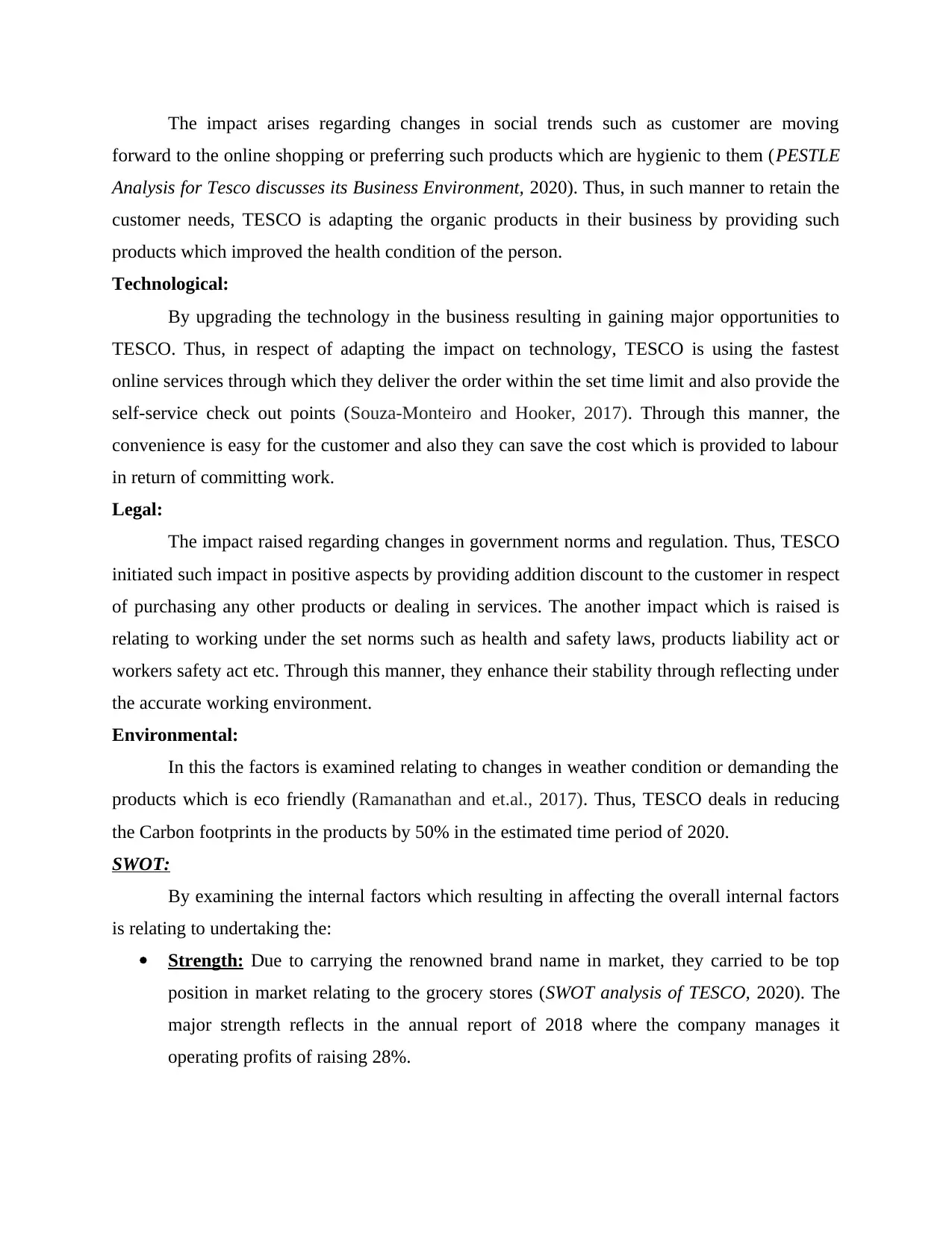
The impact arises regarding changes in social trends such as customer are moving
forward to the online shopping or preferring such products which are hygienic to them (PESTLE
Analysis for Tesco discusses its Business Environment, 2020). Thus, in such manner to retain the
customer needs, TESCO is adapting the organic products in their business by providing such
products which improved the health condition of the person.
Technological:
By upgrading the technology in the business resulting in gaining major opportunities to
TESCO. Thus, in respect of adapting the impact on technology, TESCO is using the fastest
online services through which they deliver the order within the set time limit and also provide the
self-service check out points (Souza-Monteiro and Hooker, 2017). Through this manner, the
convenience is easy for the customer and also they can save the cost which is provided to labour
in return of committing work.
Legal:
The impact raised regarding changes in government norms and regulation. Thus, TESCO
initiated such impact in positive aspects by providing addition discount to the customer in respect
of purchasing any other products or dealing in services. The another impact which is raised is
relating to working under the set norms such as health and safety laws, products liability act or
workers safety act etc. Through this manner, they enhance their stability through reflecting under
the accurate working environment.
Environmental:
In this the factors is examined relating to changes in weather condition or demanding the
products which is eco friendly (Ramanathan and et.al., 2017). Thus, TESCO deals in reducing
the Carbon footprints in the products by 50% in the estimated time period of 2020.
SWOT:
By examining the internal factors which resulting in affecting the overall internal factors
is relating to undertaking the:
Strength: Due to carrying the renowned brand name in market, they carried to be top
position in market relating to the grocery stores (SWOT analysis of TESCO, 2020). The
major strength reflects in the annual report of 2018 where the company manages it
operating profits of raising 28%.
forward to the online shopping or preferring such products which are hygienic to them (PESTLE
Analysis for Tesco discusses its Business Environment, 2020). Thus, in such manner to retain the
customer needs, TESCO is adapting the organic products in their business by providing such
products which improved the health condition of the person.
Technological:
By upgrading the technology in the business resulting in gaining major opportunities to
TESCO. Thus, in respect of adapting the impact on technology, TESCO is using the fastest
online services through which they deliver the order within the set time limit and also provide the
self-service check out points (Souza-Monteiro and Hooker, 2017). Through this manner, the
convenience is easy for the customer and also they can save the cost which is provided to labour
in return of committing work.
Legal:
The impact raised regarding changes in government norms and regulation. Thus, TESCO
initiated such impact in positive aspects by providing addition discount to the customer in respect
of purchasing any other products or dealing in services. The another impact which is raised is
relating to working under the set norms such as health and safety laws, products liability act or
workers safety act etc. Through this manner, they enhance their stability through reflecting under
the accurate working environment.
Environmental:
In this the factors is examined relating to changes in weather condition or demanding the
products which is eco friendly (Ramanathan and et.al., 2017). Thus, TESCO deals in reducing
the Carbon footprints in the products by 50% in the estimated time period of 2020.
SWOT:
By examining the internal factors which resulting in affecting the overall internal factors
is relating to undertaking the:
Strength: Due to carrying the renowned brand name in market, they carried to be top
position in market relating to the grocery stores (SWOT analysis of TESCO, 2020). The
major strength reflects in the annual report of 2018 where the company manages it
operating profits of raising 28%.
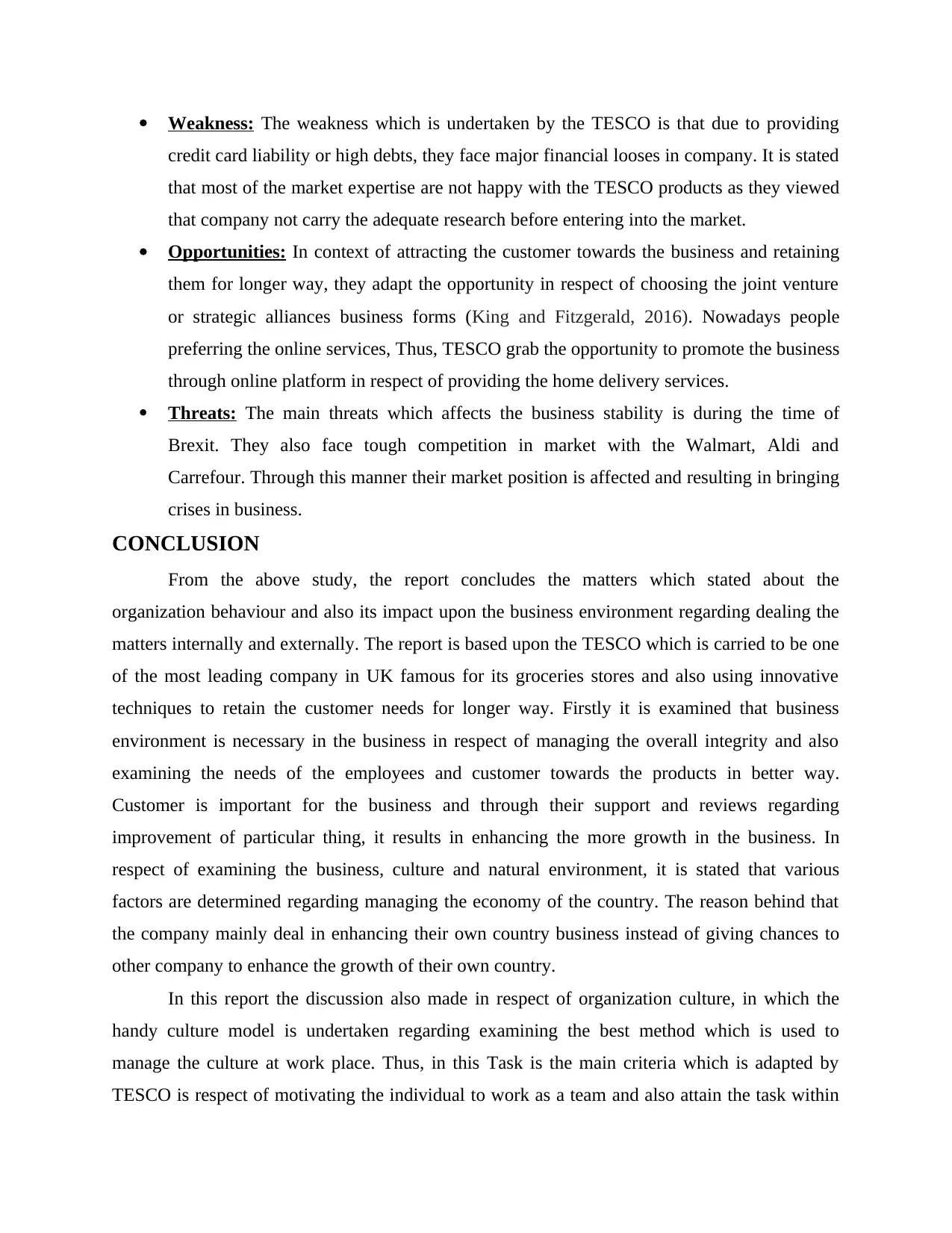
Weakness: The weakness which is undertaken by the TESCO is that due to providing
credit card liability or high debts, they face major financial looses in company. It is stated
that most of the market expertise are not happy with the TESCO products as they viewed
that company not carry the adequate research before entering into the market.
Opportunities: In context of attracting the customer towards the business and retaining
them for longer way, they adapt the opportunity in respect of choosing the joint venture
or strategic alliances business forms (King and Fitzgerald, 2016). Nowadays people
preferring the online services, Thus, TESCO grab the opportunity to promote the business
through online platform in respect of providing the home delivery services.
Threats: The main threats which affects the business stability is during the time of
Brexit. They also face tough competition in market with the Walmart, Aldi and
Carrefour. Through this manner their market position is affected and resulting in bringing
crises in business.
CONCLUSION
From the above study, the report concludes the matters which stated about the
organization behaviour and also its impact upon the business environment regarding dealing the
matters internally and externally. The report is based upon the TESCO which is carried to be one
of the most leading company in UK famous for its groceries stores and also using innovative
techniques to retain the customer needs for longer way. Firstly it is examined that business
environment is necessary in the business in respect of managing the overall integrity and also
examining the needs of the employees and customer towards the products in better way.
Customer is important for the business and through their support and reviews regarding
improvement of particular thing, it results in enhancing the more growth in the business. In
respect of examining the business, culture and natural environment, it is stated that various
factors are determined regarding managing the economy of the country. The reason behind that
the company mainly deal in enhancing their own country business instead of giving chances to
other company to enhance the growth of their own country.
In this report the discussion also made in respect of organization culture, in which the
handy culture model is undertaken regarding examining the best method which is used to
manage the culture at work place. Thus, in this Task is the main criteria which is adapted by
TESCO is respect of motivating the individual to work as a team and also attain the task within
credit card liability or high debts, they face major financial looses in company. It is stated
that most of the market expertise are not happy with the TESCO products as they viewed
that company not carry the adequate research before entering into the market.
Opportunities: In context of attracting the customer towards the business and retaining
them for longer way, they adapt the opportunity in respect of choosing the joint venture
or strategic alliances business forms (King and Fitzgerald, 2016). Nowadays people
preferring the online services, Thus, TESCO grab the opportunity to promote the business
through online platform in respect of providing the home delivery services.
Threats: The main threats which affects the business stability is during the time of
Brexit. They also face tough competition in market with the Walmart, Aldi and
Carrefour. Through this manner their market position is affected and resulting in bringing
crises in business.
CONCLUSION
From the above study, the report concludes the matters which stated about the
organization behaviour and also its impact upon the business environment regarding dealing the
matters internally and externally. The report is based upon the TESCO which is carried to be one
of the most leading company in UK famous for its groceries stores and also using innovative
techniques to retain the customer needs for longer way. Firstly it is examined that business
environment is necessary in the business in respect of managing the overall integrity and also
examining the needs of the employees and customer towards the products in better way.
Customer is important for the business and through their support and reviews regarding
improvement of particular thing, it results in enhancing the more growth in the business. In
respect of examining the business, culture and natural environment, it is stated that various
factors are determined regarding managing the economy of the country. The reason behind that
the company mainly deal in enhancing their own country business instead of giving chances to
other company to enhance the growth of their own country.
In this report the discussion also made in respect of organization culture, in which the
handy culture model is undertaken regarding examining the best method which is used to
manage the culture at work place. Thus, in this Task is the main criteria which is adapted by
TESCO is respect of motivating the individual to work as a team and also attain the task within
⊘ This is a preview!⊘
Do you want full access?
Subscribe today to unlock all pages.

Trusted by 1+ million students worldwide
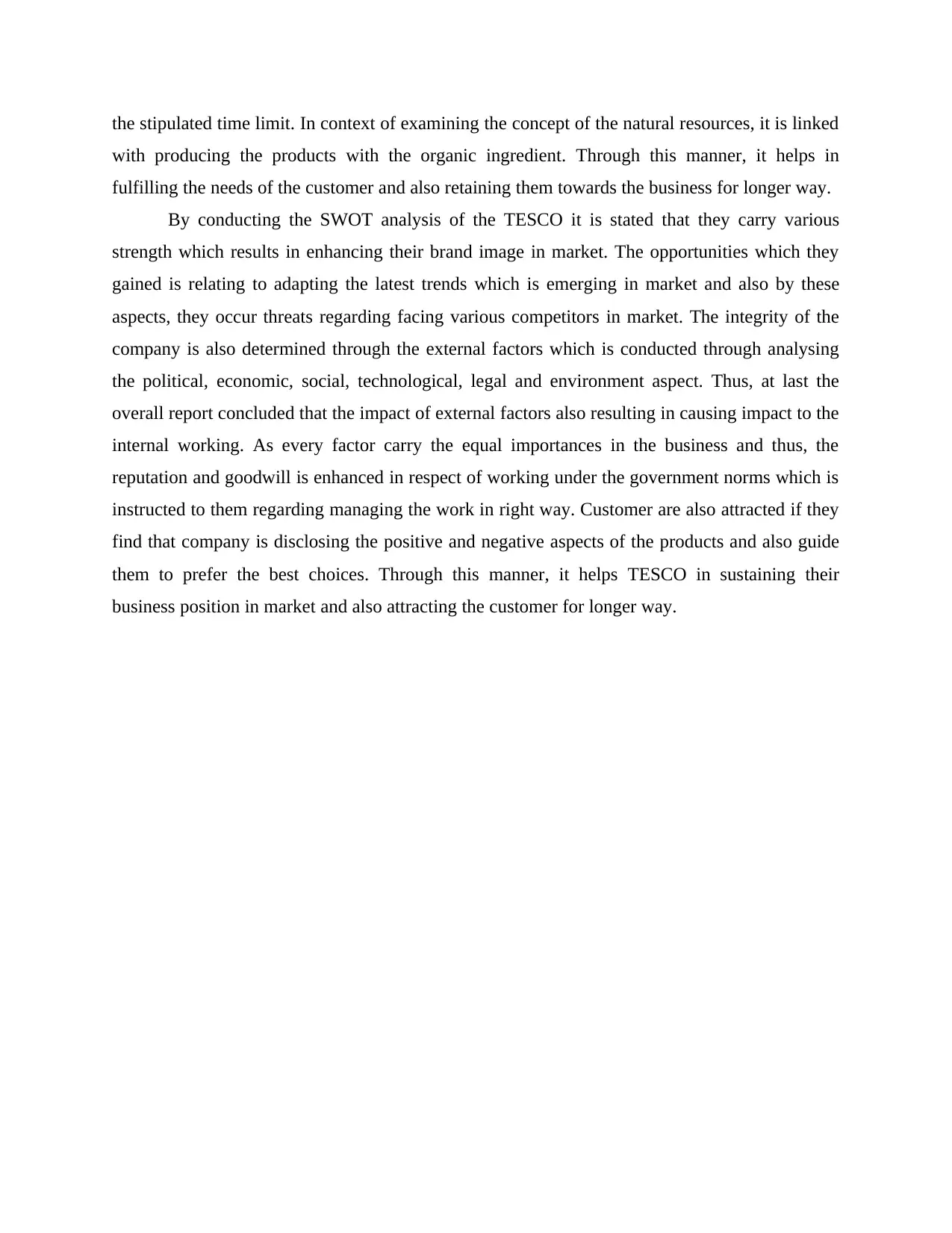
the stipulated time limit. In context of examining the concept of the natural resources, it is linked
with producing the products with the organic ingredient. Through this manner, it helps in
fulfilling the needs of the customer and also retaining them towards the business for longer way.
By conducting the SWOT analysis of the TESCO it is stated that they carry various
strength which results in enhancing their brand image in market. The opportunities which they
gained is relating to adapting the latest trends which is emerging in market and also by these
aspects, they occur threats regarding facing various competitors in market. The integrity of the
company is also determined through the external factors which is conducted through analysing
the political, economic, social, technological, legal and environment aspect. Thus, at last the
overall report concluded that the impact of external factors also resulting in causing impact to the
internal working. As every factor carry the equal importances in the business and thus, the
reputation and goodwill is enhanced in respect of working under the government norms which is
instructed to them regarding managing the work in right way. Customer are also attracted if they
find that company is disclosing the positive and negative aspects of the products and also guide
them to prefer the best choices. Through this manner, it helps TESCO in sustaining their
business position in market and also attracting the customer for longer way.
with producing the products with the organic ingredient. Through this manner, it helps in
fulfilling the needs of the customer and also retaining them towards the business for longer way.
By conducting the SWOT analysis of the TESCO it is stated that they carry various
strength which results in enhancing their brand image in market. The opportunities which they
gained is relating to adapting the latest trends which is emerging in market and also by these
aspects, they occur threats regarding facing various competitors in market. The integrity of the
company is also determined through the external factors which is conducted through analysing
the political, economic, social, technological, legal and environment aspect. Thus, at last the
overall report concluded that the impact of external factors also resulting in causing impact to the
internal working. As every factor carry the equal importances in the business and thus, the
reputation and goodwill is enhanced in respect of working under the government norms which is
instructed to them regarding managing the work in right way. Customer are also attracted if they
find that company is disclosing the positive and negative aspects of the products and also guide
them to prefer the best choices. Through this manner, it helps TESCO in sustaining their
business position in market and also attracting the customer for longer way.
Paraphrase This Document
Need a fresh take? Get an instant paraphrase of this document with our AI Paraphraser
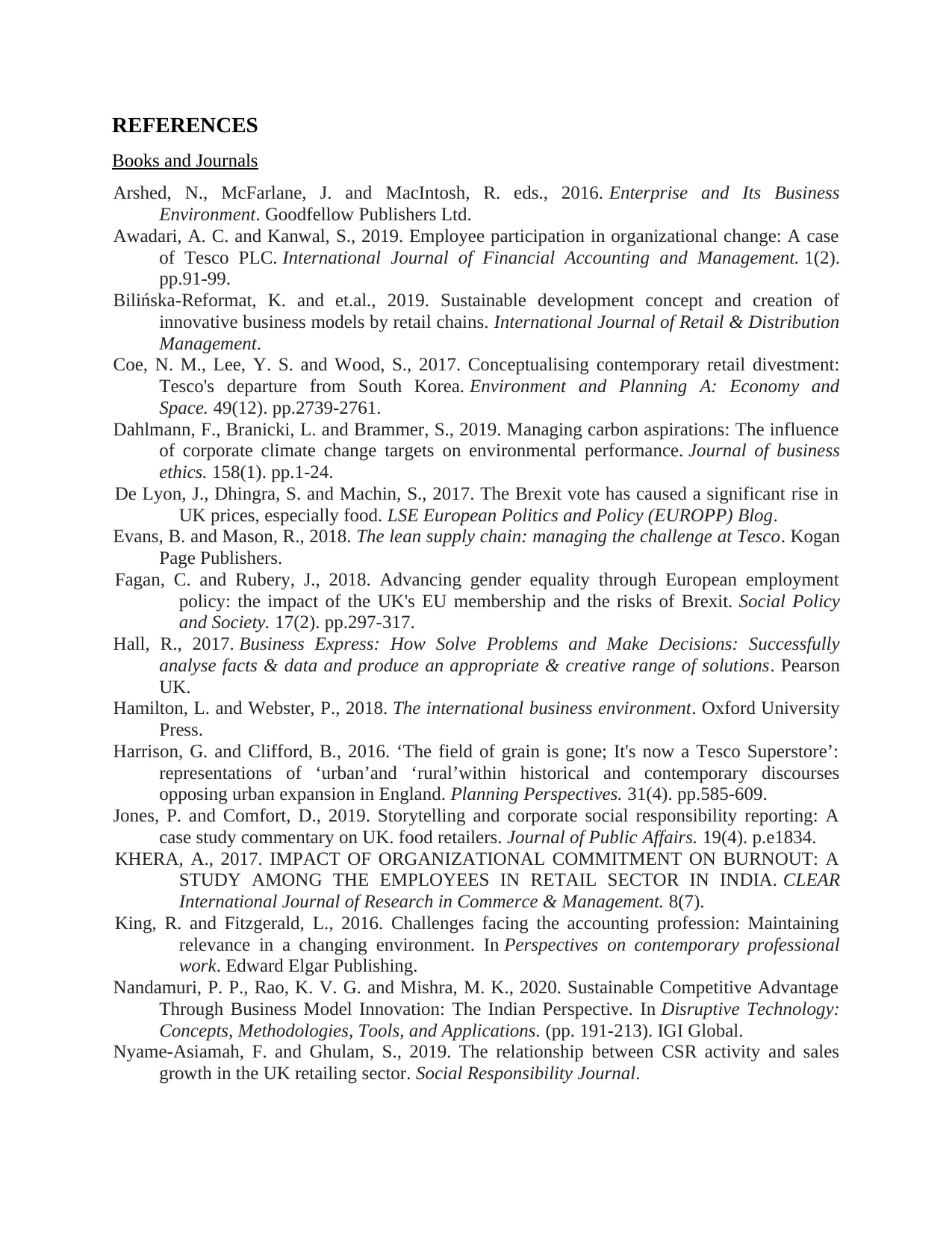
REFERENCES
Books and Journals
Arshed, N., McFarlane, J. and MacIntosh, R. eds., 2016. Enterprise and Its Business
Environment. Goodfellow Publishers Ltd.
Awadari, A. C. and Kanwal, S., 2019. Employee participation in organizational change: A case
of Tesco PLC. International Journal of Financial Accounting and Management. 1(2).
pp.91-99.
Bilińska-Reformat, K. and et.al., 2019. Sustainable development concept and creation of
innovative business models by retail chains. International Journal of Retail & Distribution
Management.
Coe, N. M., Lee, Y. S. and Wood, S., 2017. Conceptualising contemporary retail divestment:
Tesco's departure from South Korea. Environment and Planning A: Economy and
Space. 49(12). pp.2739-2761.
Dahlmann, F., Branicki, L. and Brammer, S., 2019. Managing carbon aspirations: The influence
of corporate climate change targets on environmental performance. Journal of business
ethics. 158(1). pp.1-24.
De Lyon, J., Dhingra, S. and Machin, S., 2017. The Brexit vote has caused a significant rise in
UK prices, especially food. LSE European Politics and Policy (EUROPP) Blog.
Evans, B. and Mason, R., 2018. The lean supply chain: managing the challenge at Tesco. Kogan
Page Publishers.
Fagan, C. and Rubery, J., 2018. Advancing gender equality through European employment
policy: the impact of the UK's EU membership and the risks of Brexit. Social Policy
and Society. 17(2). pp.297-317.
Hall, R., 2017. Business Express: How Solve Problems and Make Decisions: Successfully
analyse facts & data and produce an appropriate & creative range of solutions. Pearson
UK.
Hamilton, L. and Webster, P., 2018. The international business environment. Oxford University
Press.
Harrison, G. and Clifford, B., 2016. ‘The field of grain is gone; It's now a Tesco Superstore’:
representations of ‘urban’and ‘rural’within historical and contemporary discourses
opposing urban expansion in England. Planning Perspectives. 31(4). pp.585-609.
Jones, P. and Comfort, D., 2019. Storytelling and corporate social responsibility reporting: A
case study commentary on UK. food retailers. Journal of Public Affairs. 19(4). p.e1834.
KHERA, A., 2017. IMPACT OF ORGANIZATIONAL COMMITMENT ON BURNOUT: A
STUDY AMONG THE EMPLOYEES IN RETAIL SECTOR IN INDIA. CLEAR
International Journal of Research in Commerce & Management. 8(7).
King, R. and Fitzgerald, L., 2016. Challenges facing the accounting profession: Maintaining
relevance in a changing environment. In Perspectives on contemporary professional
work. Edward Elgar Publishing.
Nandamuri, P. P., Rao, K. V. G. and Mishra, M. K., 2020. Sustainable Competitive Advantage
Through Business Model Innovation: The Indian Perspective. In Disruptive Technology:
Concepts, Methodologies, Tools, and Applications. (pp. 191-213). IGI Global.
Nyame-Asiamah, F. and Ghulam, S., 2019. The relationship between CSR activity and sales
growth in the UK retailing sector. Social Responsibility Journal.
Books and Journals
Arshed, N., McFarlane, J. and MacIntosh, R. eds., 2016. Enterprise and Its Business
Environment. Goodfellow Publishers Ltd.
Awadari, A. C. and Kanwal, S., 2019. Employee participation in organizational change: A case
of Tesco PLC. International Journal of Financial Accounting and Management. 1(2).
pp.91-99.
Bilińska-Reformat, K. and et.al., 2019. Sustainable development concept and creation of
innovative business models by retail chains. International Journal of Retail & Distribution
Management.
Coe, N. M., Lee, Y. S. and Wood, S., 2017. Conceptualising contemporary retail divestment:
Tesco's departure from South Korea. Environment and Planning A: Economy and
Space. 49(12). pp.2739-2761.
Dahlmann, F., Branicki, L. and Brammer, S., 2019. Managing carbon aspirations: The influence
of corporate climate change targets on environmental performance. Journal of business
ethics. 158(1). pp.1-24.
De Lyon, J., Dhingra, S. and Machin, S., 2017. The Brexit vote has caused a significant rise in
UK prices, especially food. LSE European Politics and Policy (EUROPP) Blog.
Evans, B. and Mason, R., 2018. The lean supply chain: managing the challenge at Tesco. Kogan
Page Publishers.
Fagan, C. and Rubery, J., 2018. Advancing gender equality through European employment
policy: the impact of the UK's EU membership and the risks of Brexit. Social Policy
and Society. 17(2). pp.297-317.
Hall, R., 2017. Business Express: How Solve Problems and Make Decisions: Successfully
analyse facts & data and produce an appropriate & creative range of solutions. Pearson
UK.
Hamilton, L. and Webster, P., 2018. The international business environment. Oxford University
Press.
Harrison, G. and Clifford, B., 2016. ‘The field of grain is gone; It's now a Tesco Superstore’:
representations of ‘urban’and ‘rural’within historical and contemporary discourses
opposing urban expansion in England. Planning Perspectives. 31(4). pp.585-609.
Jones, P. and Comfort, D., 2019. Storytelling and corporate social responsibility reporting: A
case study commentary on UK. food retailers. Journal of Public Affairs. 19(4). p.e1834.
KHERA, A., 2017. IMPACT OF ORGANIZATIONAL COMMITMENT ON BURNOUT: A
STUDY AMONG THE EMPLOYEES IN RETAIL SECTOR IN INDIA. CLEAR
International Journal of Research in Commerce & Management. 8(7).
King, R. and Fitzgerald, L., 2016. Challenges facing the accounting profession: Maintaining
relevance in a changing environment. In Perspectives on contemporary professional
work. Edward Elgar Publishing.
Nandamuri, P. P., Rao, K. V. G. and Mishra, M. K., 2020. Sustainable Competitive Advantage
Through Business Model Innovation: The Indian Perspective. In Disruptive Technology:
Concepts, Methodologies, Tools, and Applications. (pp. 191-213). IGI Global.
Nyame-Asiamah, F. and Ghulam, S., 2019. The relationship between CSR activity and sales
growth in the UK retailing sector. Social Responsibility Journal.
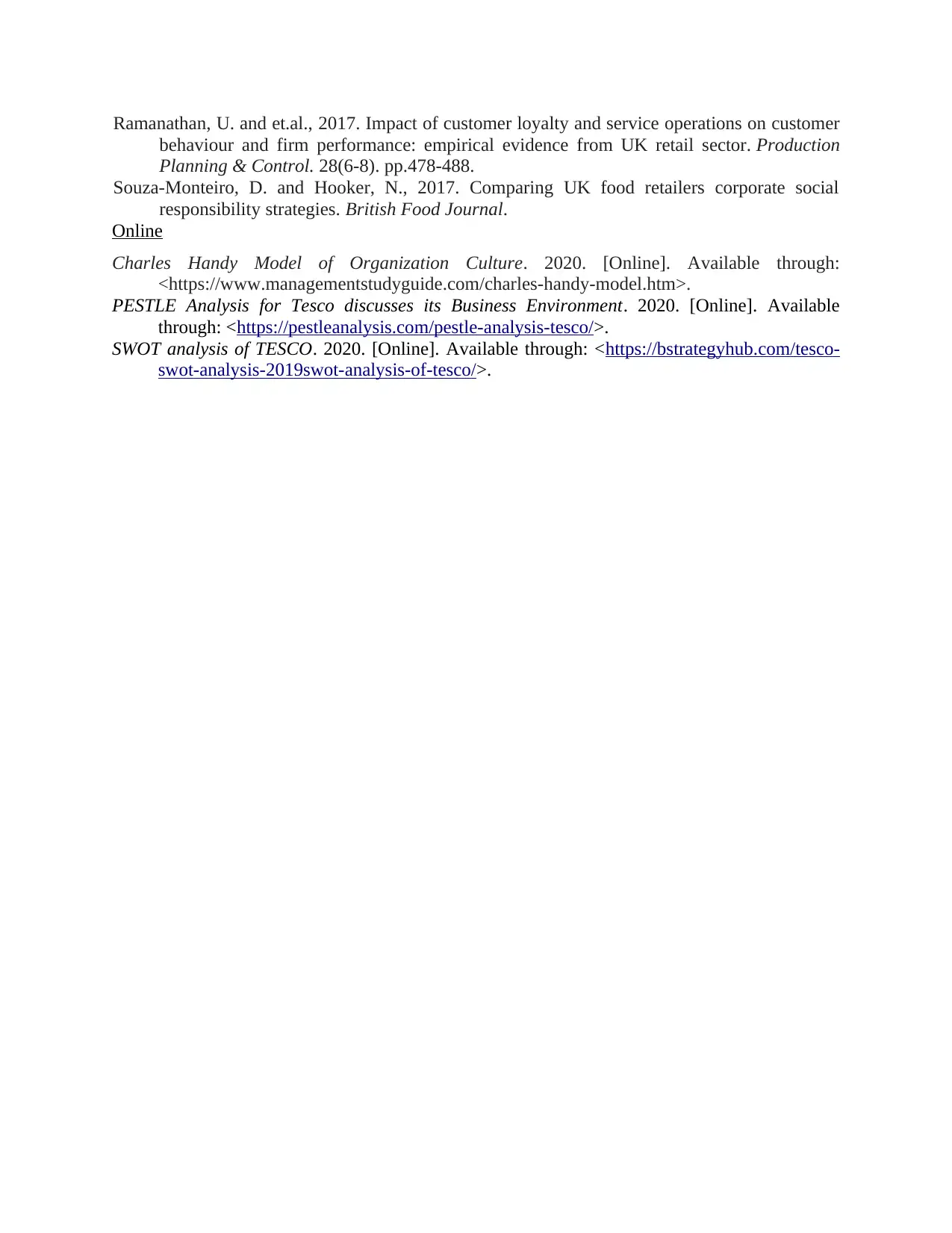
Ramanathan, U. and et.al., 2017. Impact of customer loyalty and service operations on customer
behaviour and firm performance: empirical evidence from UK retail sector. Production
Planning & Control. 28(6-8). pp.478-488.
Souza-Monteiro, D. and Hooker, N., 2017. Comparing UK food retailers corporate social
responsibility strategies. British Food Journal.
Online
Charles Handy Model of Organization Culture. 2020. [Online]. Available through:
<https://www.managementstudyguide.com/charles-handy-model.htm>.
PESTLE Analysis for Tesco discusses its Business Environment. 2020. [Online]. Available
through: <https://pestleanalysis.com/pestle-analysis-tesco/>.
SWOT analysis of TESCO. 2020. [Online]. Available through: <https://bstrategyhub.com/tesco-
swot-analysis-2019swot-analysis-of-tesco/>.
behaviour and firm performance: empirical evidence from UK retail sector. Production
Planning & Control. 28(6-8). pp.478-488.
Souza-Monteiro, D. and Hooker, N., 2017. Comparing UK food retailers corporate social
responsibility strategies. British Food Journal.
Online
Charles Handy Model of Organization Culture. 2020. [Online]. Available through:
<https://www.managementstudyguide.com/charles-handy-model.htm>.
PESTLE Analysis for Tesco discusses its Business Environment. 2020. [Online]. Available
through: <https://pestleanalysis.com/pestle-analysis-tesco/>.
SWOT analysis of TESCO. 2020. [Online]. Available through: <https://bstrategyhub.com/tesco-
swot-analysis-2019swot-analysis-of-tesco/>.
⊘ This is a preview!⊘
Do you want full access?
Subscribe today to unlock all pages.

Trusted by 1+ million students worldwide
1 out of 12
Related Documents
Your All-in-One AI-Powered Toolkit for Academic Success.
+13062052269
info@desklib.com
Available 24*7 on WhatsApp / Email
![[object Object]](/_next/static/media/star-bottom.7253800d.svg)
Unlock your academic potential
Copyright © 2020–2026 A2Z Services. All Rights Reserved. Developed and managed by ZUCOL.




